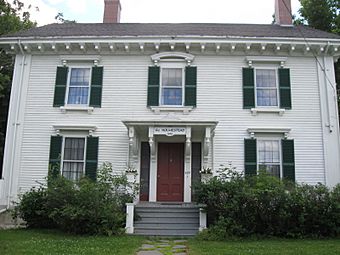Dr. Job Holmes House facts for kids
Quick facts for kids |
|
|
Dr. Job Holmes House
|
|
 |
|
| Location | 527 Main St., Calais, Maine |
|---|---|
| Area | less than one acre |
| Built | 1850 |
| Architectural style | Italianate |
| NRHP reference No. | 90000579 |
| Added to NRHP | April 5, 1990 |
The Dr. Job Holmes House is a cool old house located at 527 Main Street in Calais, Maine. It was built way back in 1850 by a famous local doctor named Dr. Job Holmes. This house is a great example of a building style called Italianate architecture.
Today, the St. Croix Historical Society owns it. They also own Dr. Holmes' first house, the Holmes Cottage, which is right next door. The cottage is now a museum! The Dr. Job Holmes House was added to the National Register of Historic Places in 1990. This means it's an important historical building.
Contents
What Makes the Dr. Job Holmes House Special?
The Dr. Job Holmes House is on the south side of Main Street (United States Route 1). It's just a short walk east of the main downtown area. Right next to it is the Holmes Cottage, which is also owned by the St. Croix Historical Society.
Looking at the House's Design
This house is made of wood and has two and a half stories. It has a roof that slopes down on two sides. There are brick chimneys inside the house that are not perfectly centered. The outside walls are covered with clapboard siding. The house sits on a strong granite foundation.
The front door is in the middle of the house. It has a fancy, decorative cover above it. This cover is held up by brackets. There's also a wider cover over the windows next to the door. The windows on the front of the house also have decorative covers above them. The one on the second floor in the middle has a curved top. The main roof has decorative blocks called modillions.
Inside the House
The inside of the house is very well-preserved. This means it still looks much like it did when it was first built. You can see the original wooden details and plaster walls.
Who Was Dr. Job Holmes?
Dr. Job Holmes came to Calais sometime after 1830. He started his medical practice there. He worked with his brother-in-law, Cyrus Hamlin. Cyrus was the brother of Hannibal Hamlin, who later became the Vice President of the United States!
The Holmes family first lived in the smaller cottage next door. Then, around 1850, they had this bigger house built. A local builder named Asher Bassford built it. He was known for his high-quality work.
The house stayed in the Holmes family for many years, even into the 1900s. Before the St. Croix Historical Society took it over, it was used as housing for older people. Now, it helps tell the story of Calais's past!
 | Janet Taylor Pickett |
 | Synthia Saint James |
 | Howardena Pindell |
 | Faith Ringgold |



